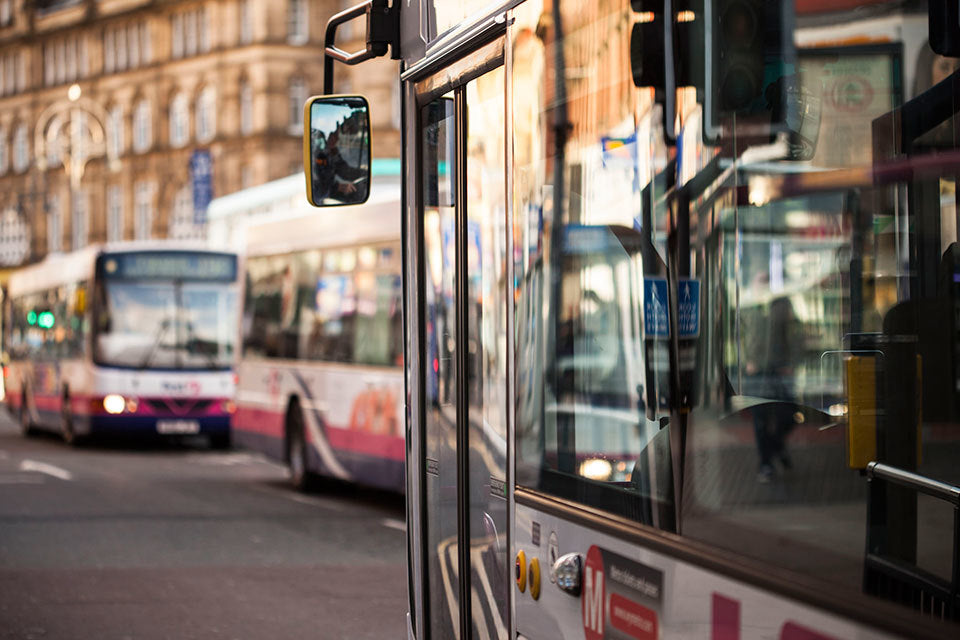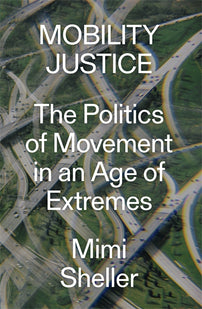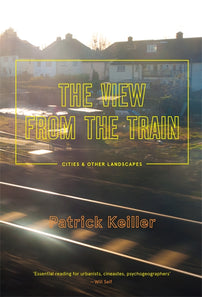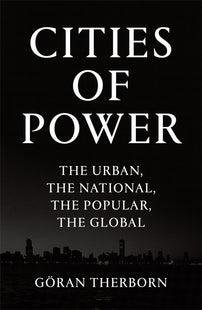Developing new left visions for public transport
Current left proposals for public transport in the UK are too narrow, focused on either commuting or long-distance travel. It’s time for us to develop new and radical solutions for transport to rebuild Britain’s social fabric, based on free public transport at all levels and a radical reduction in car usage.

In 2018, the single biggest expenditure for UK households was transport, accounting for around 14% of the average weekly household cost.[i] For those who rent rather than own their own home, transport expenditure is lower coming in second place after housing costs[ii]. Most people spend at least an hour a day travelling[iii], whether that’s going to and from work or school, or for pleasure – and even longer if they live further out of town[iv]. Yet, under the current system daily journeys are made stressful[v], unreliable[vi], and harmful or even dangerous[vii] to other people[viii] and nature[ix] by the transport system and the political system we live under.
Safe, cheap, convenient transport – by bus, train, cycle, on foot, or even car – is as necessary for our everyday lives as having decent homes. But unlike housing, there is no coherent left vision for transport. Whereas there are dozens of energetic and innovative housing campaigns that conceptualise the right to housing as simultaneously an opportunity for human expression and freedom, and a financial commodity under neoliberalism, there is currently no comparable terrain of struggle, we rarely discuss transport at all, let alone how to bring it into common ownership.
Transport as state investment
On occasions when the left does talk about transport, it's normally conceptualised in one of two ways. The first is transport as state investment, and the policy prescriptions that tend to come from this are based around bringing back disused railway lines[x] and reviving British Rail as an alternative to the current system of privatised rail providers[xi]. Yet, there is a nostalgia inherent to this vision that serves to mischaracterise the type of journeys most people actually make. In reality, the majority (68%) of journeys are of less than 5 miles, and 37% of those are less than 1 mile[xii]. By definition, these short trips are not being made by intercity rail, so a left conceptualisation of transport with this as its central policy simply isn't durable. While it is good that the left is steadfast on supporting low-carbon infrastructure, we've got to expand this idea into a vision for how those short trips occur.
Furthermore, having a policy as the central idea doesn't in itself produce a broader vision: it only tells us how to act when we're in national office (perhaps why it's predominant in the Labour Party[xiii]). The problem here is that this locates power solely at the level of national government, when in fact local authorities, and even individual neighbourhoods, are just as influential in shaping how we get around. Simply relying on the national government to plan the transport system won't get us where we need to be.
Transport as work
The second, more recent conceptualisation is oriented around technology. In this vision transport itself is seen as work. This is usually framed in one of three ways. In the first, all transport is discussed in terms of journeys to work, specifically as commuting. Yet once more this misses the type of trips people actually make: only 27% of journeys are commuting to work, while 35% are for shopping and 16% are for visiting friends[xiv]. Nevertheless, this framing presents commuting as a problem, and presents a part financial contribution[xv] by employers as the solution.
This also raises questions about the implementation of such a scheme, and the potential regressive consequences that could come from it. In the short-term, planning of transport networks from both the public and private sector would increasingly revolve around the promise of a steady income from destination businesses, serving to concentrate existing transport services towards single, denser areas and drawing them away from less dense areas. This would have consequences for rural and isolated communities, furthering the already uneven access to transport. Longer term, these effects could multiply, mimicking planning gain[xvi] (developers’ contributions to affordable housing and surrounding transport networks) in funding models which lock local authorities into orienting the city around workplaces.
In the recent era, marked by chronic underfunding[xvii], private sector contributions from planning gain (and models that mimic it) aren't a solution. Ultimately, they trap local authorities into a cycle of low central grant and perpetual development[xviii], within a power relation where public bodies are the weaker side (something of a ‘Faustian Pact’[xix]). We've already made this mistake with affordable housing; it would be a mistake then to replicate this by planning our transport system around the whims of private business.
The second framing posits all transport as work, whether or not the traveller is on the way to their job. This framing bases itself on the idea that moving around (walking, cycling, driving[xx]), including route planning and decision making on the way, is a task people should be relieved of[xxi] (or paid for[xxii]). Here, the policy fix would involve the development of fleets of (electric) autonomous vehicles introduced to cities[xxiii].
Yet, apart from any other effects (like increased road death figures, and the criminalisation of the pedestrian[xxiv]), the left should be wary of solutions of this kind that only continue the dominance of cars and entrench it through electric charging infrastructure. There is a much simpler, healthier, more enjoyable route, impossible if we see travelling as a burden:, turning our cities and streets to a more walkable scale [xxv].
As for self-driving cars, a reduction in driving doesn’t necessarily mean a reduction in time spent in the car: technological hacks (not on the left) foresee less time spent driving offering more time for working during the journey[xxvi]. It's a risky vision that trades in the potential for joy, health and exploration in our transport now, for a longer working day in the future.
The third framing is reserved for when transport actually is work. Transport jobs, both of freight and people, are vital and valuable for keeping society going[xxvii]. Union members and organisers in these industries are at the frontline of the current left[xxviii]: developing new strategies around logistics strikes[xxix] and lynchpin transport interchanges[xxx]; much-needed novel forms of picket line for a place of work in motion[xxxi]; and making clear the continued imperative to block roads[xxxii].
A left transport vision would expand efforts from the new transport unions, to organise transport users[xxxiii] not as consumers[xxxiv] but as occupants with a right to roam.
A positive left vision
A positive left vision of transport would seek to bring transport into common ownership, similar to how we envision housing. In the meantime, it would put enjoyment of journeys first and foremost[xxxv], embedding the right to the city (and country) in everyday travel.
Parts of this vision have been set out above, and minimising carbon emissions (including a frequent flyers’ tax[xxxvi]) needs no more justification. One point should be made explicit though: that joy in transport is possible, and is the inverse of a transport system centred around work. It's not superficial to talk about maximising enjoyment of the necessities of life. We all want to work less and do more of what we enjoy. These kinds of purposeless journeys, by loiterers, ramblers, joggers, children and teenagers, to anywhere or nowhere[xxxvii], should have pride of place in a left vision of transport – highlighting the variety of ways young and old people enjoy space.
A transport system designed for people not at work (including those who never work, like children, retirees) would look entirely different from the car-centric, radial one we have now, and would improve quality of life for everyone. That means reducing car ownership[xxxviii] and taking inspiration from Europe: the urban realm of Assen in the Netherlands[xxxix], and Barcelona's superblocks[xl]. These examples explicitly facilitate children's right to the street by walking and running, skipping and cycling, scooting and skating, a reminder that transport is more than the public transport network.
Of course, some longer trips have to use the public transport network, and a left transport vision should propose that they are free[xli]. We should delineate fare-dodging on trains and buses as more akin to trespass[xlii] than theft, as without its prefigurative efforts to decommodify journeys, it’s easy to forget that public transport networks themselves are (currently) private property.
It’s urgent to clarify our vision of transport (and its relationship with work) because the new Conservative Government is already setting out theirs[xliii]. They say the ‘right to get to work’ trumps workers’ right to strike for good pay and conditions. This is a clear arrangement of both office workers above transport workers, and of working as the ultimate goal of life. We on the left know there’s more to life than work[xliv], so we shouldn’t let transport go without a fight.
Pearl Ahrens is a transport planner and an active member of London Renters Union and London Cycling Campaign.
[book-strip index="1" style="display"][i] https://www.ons.gov.uk/peoplepopulationandcommunity/personalandhouseholdfinances/expenditure/bulletins/familyspendingintheuk/financialyearending2018
[ii] https://www.ons.gov.uk/peoplepopulationandcommunity/personalandhouseholdfinances/expenditure/datasets/householdexpenditurebytenureuktablea32
[iii] https://www.tuc.org.uk/news/annual-commuting-time-18-hours-compared-decade-ago-finds-tuc
[iv] https://assets.publishing.service.gov.uk/government/uploads/system/uploads/attachment_data/file/853574/journey-time-statistics-2017.pdf
[v] https://www.vice.com/en_uk/article/nnm84g/why-is-the-uk-border-agency-racially-profiling-people-on-the-tube
[vi] https://www.bbc.co.uk/news/business-47040644
[vii] https://assets.publishing.service.gov.uk/government/uploads/system/uploads/attachment_data/file/834585/reported-road-casualties-annual-report-2018.pdf P.15
[viii] https://www.kcl.ac.uk/news/new-research-shows-over-4000-londoners-hospitalised-in-three-years-due-to-harmful-air-pollution
[ix] https://assets.publishing.service.gov.uk/government/uploads/system/uploads/attachment_data/file/790626/2018-provisional-emissions-statistics-report.pdf
[x] https://bettertransport.org.uk/re-opening-rail-lines
[xi] https://www.bringbackbritishrail.org/
[xii] https://assets.publishing.service.gov.uk/government/uploads/system/uploads/attachment_data/file/823068/national-travel-survey-2018.pdf P.19
[xiii] https://www.policyforum.labour.org.uk/news/labours-pledge-to-improve-our-railways
[xiv]https://assets.publishing.service.gov.uk/government/uploads/system/uploads/attachment_data/file/823068/national-travel-survey-2018.pdf p.20
[xv] https://www.versobooks.com/blogs/news/4476-claim-your-commute
[xvi] https://www.planningportal.co.uk/directory_record/430/planning_gain
[xvii] https://www.local.gov.uk/sites/default/files/documents/5.40_01_Finance%20publication_WEB_0.pdf P.3
[xviii] https://www.housingtoday.co.uk/comment/its-time-to-be-honest-about-planning-gain/5099021.article
[xix] http://www.tenantstogether.org/updates/poor-doors-show-why-we-cant-rely-developers-affordable-housing
[xx] http://luxurycommunism.com/2019/06/24/the-case-for-a-peoples-uber/
[xxi] https://theconversation.com/driverless-cars-once-theyre-on-the-road-human-drivers-should-be-banned-118293
[xxii] https://www.redpepper.org.uk/wages-for-commuting/
[xxiii] Bastani, Aaron. (2019) Fully Automated Luxury Communism. Verso. P.83-86.
[xxiv] https://www.citylab.com/solutions/2019/03/technopolis-podcast-episode-2/584161/
[xxv] https://www.bbc.co.uk/news/av/world-50269778/what-would-a-city-designed-by-women-be-like
[xxvi] https://www.aitrends.com/selfdrivingcars/productivity-gains-or-losses-via-ai-self-driving-cars-the-inside-view/
[xxvii] Harvey, David. Rebel Cities. Verso. P.131-2.
[xxviii] https://novaramedia.com/2019/01/18/londons-air-quality-is-a-problem-but-sadiq-khans-congestion-charge-isnt-the-solution/
[xxix] https://www.transnational-strike.info/wp-content/uploads/Logistics-the-Transnational-Social-Strike-%E2%80%94-TSS-Journal-Fall-2017-1.pdf
[xxx] https://www.ft.com/content/61a29a70-0948-11e4-906e-00144feab7de
[xxxi] https://www.vice.com/en_uk/article/gyzn79/riding-for-deliveroo-made-me-fight-for-the-future-of-work and Cant, Callum. Riding for Deliveroo. Polity. P.127-8.
[xxxii] Cant, Callum. Riding for Deliveroo. Polity. P.160.
[xxxiii] https://www.citylab.com/equity/2019/10/chile-protest-santiago-metro-public-transit-fare-inequality/600874/
[xxxiv] https://www.theguardian.com/cities/2018/may/11/no-ticket-to-ride-japanese-bus-drivers-strike-by-giving-free-rides-okayama
[xxxv] https://www.youtube.com/watch?v=VkFnDid32dg
[xxxvii] https://research.birmingham.ac.uk/portal/files/21103855/Walking_just_walking.pdf?fbclid=IwAR2kTlDV72JowK_pOfCuyu3zh4UfSM87DEcwzKTJgtdaJVuoYxiQ0bT2s2M
[xxxviii] https://www.common-wealth.co.uk/reports/away-with-all-cars-redux
[xxxix] http://www.aviewfromthecyclepath.com/2013/09/the-school-run-in-assen.html
[xl] https://www.youtube.com/watch?v=jq2yd4QgL5I
[xli] https://www.jacobinmag.com/2018/08/public-transportation-brussels-free-tickets
[xlii] https://en.wikipedia.org/wiki/Mass_trespass_of_Kinder_Scout
[xliii] https://www.standard.co.uk/news/transport/new-law-will-enshrine-right-of-commuters-to-minimum-service-during-strikes-says-grant-shapps-a4314471.html
[xliv] https://tribunemag.co.uk/2019/12/theres-more-to-life-than-this





